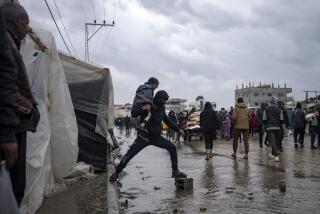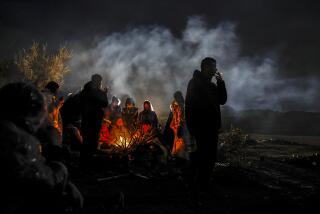Bitterness Swirls Around Refugee Camp in Iraq
- Share via
SAFWAN, Iraq — The desert winds rise up at midday, churning dust devils that spin through the refugee camp like tiny tornadoes to shred tents and topple lean-tos. The rebels pay the angry winds little heed.
“At least,” says one, “we are alive.”
Less than a week ago, the camp, dubbed Hotel Calcutta by the U.S. troops who run it, held no refugees. By the weekend, it was crowded with more than 5,500, most of them Shiite Muslims and their families who claim to have supported the failed uprising against Saddam Hussein in southern Iraq.
While Kurdish forces continued to battle in the north, the Iraqis who have sought safety here predict that the Kurds’ revolt, like theirs in the south, is doomed to fail because of inaction on the part of the U.S. military.
“The Americans will not help us,” complained Hussein Mayof Jasim, 24, “and without the Americans, we can do nothing.”
Hotel Calcutta, so named by American soldiers because it is situated on the grounds of an abandoned Indian trading company, is alive with stories of Iraqi atrocities and cease-fire violations committed against civilians within the last week. Horrific violations have commonly occurred within clear view of American forces, they say. Yet in each case, according to those interviewed, U.S. troops took no steps to intervene.
One self-professed rebel, for example, said he participated in an attack last Wednesday on government tanks south of the city of Samawah. Loyalist forces using helicopter gunships retaliated, he said, by bombing and strafing civilian targets. Orbiting high above the helicopters, he said, were U.S. jet fighters whose pilots apparently observed the fighting but made no attempt to intervene.
“Many, many of the people were killed--women, children, men,” said the rebel, who would identify himself only as Ihsan, 30. “It is a conspiracy between U.S. and Saddam.”
Others insisted that they have witnessed more than two dozen Scud missile attacks in recent days in the cities of Najaf and Karbala. Any Scud attack would pose a clear violation of the tentative cease-fire that Iraq agreed to after retreating from Kuwait in February.
However, a spokesman for the U.S. military’s Central Command in Riyadh, Saudi Arabia, Lt. Cmdr. John Tull, said Sunday that he could not confirm any Scud launchings.
As for American pilots observing Iraqi helicopters in action against civilian targets, Tull said simply that “we do maintain surveillance flights” over Iraq.
Although the Hotel Calcutta refugee camp opened only last Wednesday, its commander said he already is used to fielding questions from Iraqis frustrated that the United States has not actively supported the rebellion.
“They ask us, ‘Why don’t you go in and topple Saddam?’ ” said Lt. Col. Bruce Masey, 43, an Army reservist. “What do you say? You have to obey the rules of war. And as long as a cease-fire is in effect, there is not much we can do. We’re just trying our best to take care of these people.”
Conditions at the camp may be primitive, but there are U.S. Army medical personnel at the site and, refugees acknowledge, adequate supplies of water and food.
Still, some complain that the MRE (Meals, Ready to Eat) rations they usually receive, the same ones issued to American troops, are barely palatable.
More to Read
Sign up for Essential California
The most important California stories and recommendations in your inbox every morning.
You may occasionally receive promotional content from the Los Angeles Times.













